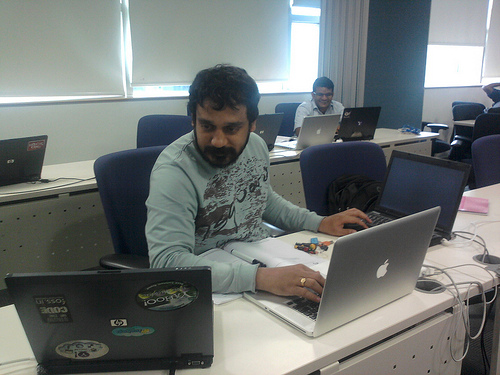How do you focus on the stuff that matters?
January 31, 2014
Think back a month. A new year was about to start, you’d probably had at least a week away from work and maybe that had given you a sense of perspective. Perhaps you didn’t think about work at all, as you spent time on other things that matter in your life. Or maybe you got a different angle on some difficult unresolved issue. Or perhaps your mind wandered to the bigger things you’d like to achieve this year, the ways you could be more effective, the initiatives that would really make a difference.
So now it’s the end of January and the New Year seems like a long time ago. Is anything different or did you slip back into familiar patterns once the office Christmas decorations were down? If so, you’re not alone. Amongst my coaching clients, especially senior managers, I find the thing they value most is the opportunity to step back from the day-to-day detail and yet it’s the thing they prioritise least. Too often, the operational takes precedence over the strategic, the urgent wins out over the important. The bigger stuff can always wait. Except it can’t really – opportunities are lost, problems fester, people and organisations plod along, not really fulfilling their potential. So how do you break out of it? I think it’s about two things – time and focus.
Time as a finite resource
Too many of us treat time as an inexhaustible resource, as though there will always be more of it. I am horribly prone to this way of thinking myself. One of the things that has helped me re-evaluate the way I use my time is an intriguing approach from Laura Vanderkam, called 168.  The premise is this: at the start of each week, you get 168 hours. That’s all there is; you cannot create any more. Treat it like a budget and be more considered about how you spend it. Simple but effective.
The premise is this: at the start of each week, you get 168 hours. That’s all there is; you cannot create any more. Treat it like a budget and be more considered about how you spend it. Simple but effective.
The problem a lot of my clients encounter, however, is that they allocate their ‘time budget’ to something important but then they give it away when other things crop up. There are a number of ways to avoid this one. Firstly, think about how you describe that time to yourself and others. One of my clients tried allocating a day a fortnight working at home, thinking, planning and reviewing. And then he labelled it ‘Admin day’. It became a bit of contingency time to catch up with himself. His PA knew she could squeeze a meeting in there if she needed to. Not a lot of high level work went on.
The importance of clarity
But even if he’d called it ‘Strategic thinking day’ he still might not have protected that time. The clearer you are about what you want to achieve in that time, the more likely you are to use it for that purpose. So objectives such as ‘Review operational cost base’ or ‘Develop plan to streamline sales processes’ are more likely to get done than vague tasks like ‘planning’.
It may sound like stating the obvious, but it’s incredibly important to give things a deadline. I find that Operational Managers, accustomed to measuring day-to-day, month-to-month performance figures, budgets and so on, tend not to think about deadlines in this way. These higher level, non-routine tasks become mini-projects (or sometimes full blown projects) and require a shift in mindset. You have to become a project manager as well as an operational manager.
Focus and the myth of multi-tasking
So what about focus? Well the more we learn about how the brain works the more interesting this gets. Contrary to popular wisdom, no one can multi-task. The brain can only focus on one conscious task at a time. Sure we can do two things at once if one of them is so well-practised we’re on auto-pilot. That’s why an experienced driver can hold an in-depth conversation while whizzing up the motorway, but a learner has to keep all their attention on the driving.
If you try to do two or more tasks that require conscious attention at the same time, you just keep flipping between them and you’re far more likely to make mistakes. So don’t try. When you’re putting time aside for focused thinking, switch your phone off and stop checking your emails. If at all possible, go somewhere where you won’t be interrupted. Otherwise, you’ll lose focus and it takes on average 23 minutes to get back to where you were.
It’s also worth monitoring how and when you do your best thinking. I know that if I’m exploring possibilities, I work best if I’m kicking ideas around with other people. When I want to refine an idea, I’m best on my own. And I often get real clarity when I’m out running. Work out what works for you – it’s unlikely to be sitting at your desk in front of a computer.
A date with a sounding board
Another way of carving out some time to focus on the higher level issues is to have a regular appointment with someone who acts as a sounding board. The discipline of having that time in the diary makes you look at the stuff that you might otherwise let slide. I can get so caught up delivering to clients that I forget to market myself, so I use a business coach to keep me on track (Hi Chris!). Similarly I know one of the things I offer my coaching clients is a fixed point where they know they’ll be focusing on what matters – whether that’s how they manage people, how they influence upwards or where they should focus their energy and attention. If you’re a manager battling against the small stuff and that sounds like something you’d find useful, I’d be happy to have a chat.
Photo credits
January calendar: Alyson Hurt
Hour glass: Keith Davenport
Multi-tasking: Balu





